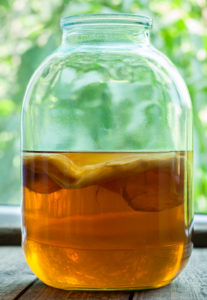Have you ever walked through a grocery store and asked yourself, “What the heck is that?!”? You are in good company. Because even as a dietitian, I am often amazed at the new & unique foods that are now available at the most conventional of supermarkets. And I often receive a lot of questions about these foods. Which is why I will be running a regular feature on this blog…What The Fork?! Food Reviews. I’m going to tell you what the fork the food is, what is good (or not so good) about it, and whether I think you should try it. Sound like a plan? Okay, let’s go.
For my first review, I present to you: Kombucha.
What is Kombucha?

Kombucha is a curious concoction, dating way back to circa 212 B.C. in eastern Asia1. Over a few centuries, the making of kombucha eventually spread from eastern Asia to Russia and Europe. And now you can’t walk through a Whole Foods in the US suburbs without a demo dude shoving a sample in your face.
Kombucha is made by combining a few simple ingredients – tea, sugar and a bacteria/yeast starter. This creates a “symbiotic colony” of bacteria and yeast (aka SCOBY)1. This SCOBY is then allowed to ferment for some time, which then creates a funky, mushroom-looking layer on top of the tea. Some people like to call this a “Manchurian Mushroom”, but this is a complete misnomer as this is not a fungus. Like I said, it is a combo of bacteria and yeast. Different microbes, y’all.
What are the Claims?
The microbes in kombucha are also credited as “probiotics”, which are all the rage these days. For good reason, as research continues to crack the code of the human microbiome (all the bugs in the body and how they work together), and its significant impact on human health2. However, currently there are no peer-reviewed, scientific human studies which investigate the health benefits of the specific & various combinations of probiotic strains found in kombucha. But despite this, some advocates tout that kombucha is beneficial for immune function. And some have gone as far as to say it is also good for cancer prevention, weight loss, improved digestion, and detoxification. Which is likely a stretch. But while it may be possible that kombucha may indeed provide some health benefits, there simply isn’t enough science on kombucha to prove these claims yet. Bummer, right?
Is Kombucha Safe?
This is a loaded question, because kombucha is complicated.
First of all, let’s start with the alcohol content. The fermentation process that makes kombucha also produces alcohol. So unless a special filtration or pasteurization process is used (as is now used in commercial kombucha production), you can expect kombucha to contain 0.5% to 1.5% alcohol3,4. While this isn’t much alcohol in the grand scheme of things, it is still alcohol. And it has created some controversy over the last few years, from an issue with a kid’s lunchbox to the Federal Alcohol, Tobacco Tax and Trade Bureau intervening on production standards.
And because of the centuries-old legacy of making kombucha, along with the $2-$3 price tag per bottle at retail, some people have decided to make kombucha at home the old-school way. However, this is risky. If you don’t use the correct type of container for fermentation, you may risk toxic chemicals entering the tea4. It is also possible for an actual fungus – mold – to set up shop in your kombucha when doing this at home4.
So, the answer is yes and no. Yes, commercially-available kombucha is safe for healthy adults. But it would be best that children, immunocompromised individuals, pregnant women, and elderly adults all just say no to kombucha2,4. Especially homemade kombucha.
Is it Worth Trying?
If you are a curious healthy adult, and willing to spend $2-$3 per bottle, then go for the kombucha! But if you try it and don’t like how it tastes, don’t despair. There are lots of other fermented foods to choose from that pack probiotics, like yogurt, kefir, kimchi, miso, sauerkraut, & more. And at the end of the day, it is varied diet – with lots of fruits & veggies – that makes the biggest difference in overall health. Not just one trendy tea.
Do you have a What the Fork?! question? Email me (see bottom of page) or send me a message on Facebook or Instagram, and I’ll answer in my next food review post!
(Disclosure – No compensation or sponsorship was provided for this article. The opinions and statements reflected here are entirely my own.)
Sources:
- Sreeramulu G, Zhu Y, Knol W. Kombucha fermentation and its antimicrobial activity. J Agric Food Chem. 2000;48(6):2589-2594.
- Fijan S. Microoganisms with claimed Probiotic Properties: An Overview of Recent Literature. Intl J Environ Res Public Health. 2014. (11) 4745-4767. DOI:10.3390/ijerph110504745.
- Bureau of Alcohol, Tobacco, and Firearms. Kombucha. Available: https://www.ttb.gov/kombucha/
- Centers for Disease Control and Prevention. Unexplained severe illness possibly associated with consumption of kombucha tea—Iowa, 1995. MMWR. 1995;44(48):892-893, 899-900.




Didn’t know what kombucha was and after reading your description of it I am sure I can live out my life not trying it. Very interesting write-up!
Great post! I’ve always been curious, but do feel like I can live without it in my life too! 🙂
Thanks Stephanie! Haha, I understand! I’ll have the occasional kombucha, but it isn’t really something I crave. 🙂